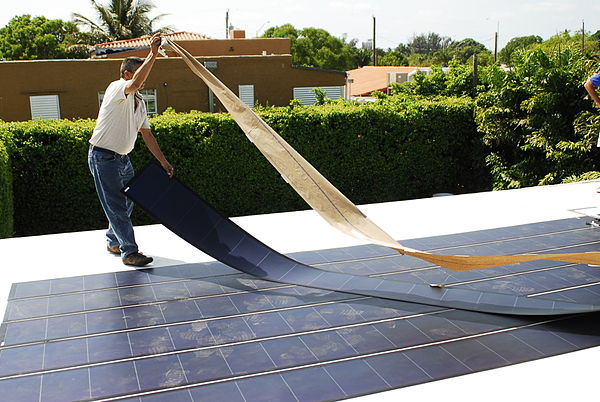Proposition 23 was a California ballot proposition that was on the November 2, 2010 California statewide ballot. [1] It was defeated by California voters during the statewide election by a 23% margin. [2] [3] [4] If passed, it would have suspended AB 32, a law enacted in 2006, legally referred to its long name, the Global Warming Solutions Act of 2006. [5] Sponsors of the initiative referred to their measure as the California Jobs Initiative while opponents called it the Dirty Energy Prop. [6]

In California, a ballot proposition can be a referendum or an initiative measure that is submitted to the electorate for a direct decision or direct vote. If passed, it can alter one or more of the articles of the Constitution of California, one or more of the 29 California Codes, or another law in the California Statutes by clarifying current or adding statute(s) or removing current statute(s).
The Global Warming Solutions Act of 2006, or Assembly Bill (AB) 32, is a California State Law that fights global warming by establishing a comprehensive program to reduce greenhouse gas emissions from all sources throughout the state. AB 32 was authored by then-Assembly member Fran Pavley and Assembly Speaker Fabian Nunez and signed into law by Governor Arnold Schwarzenegger on September 27, 2006.
Contents
- Details
- Support
- Individual Supporters
- Large corporations
- Political parties
- Taxpayer advocate organizations
- Trade organizations
- No longer support
- Donors
- Consultants
- Opposition
- Opponents
- Donors 2
- No on 23 Publicity
- Tactics
- Impact on gubernatorial election
- Path to the ballot
- Result
- References
- Further reading
- External links
The goal of the proposition was to freeze the provisions of AB 32 until California's unemployment rate dropped to 5.5% or below for four consecutive quarters. Since the rate was then at 12.4%, and it had been decades since the state had seen an unemployment rate below 5.5% for such a period of time, this wording was seen by former Gov. Arnold Schwarzenegger and others as a wording trick to delay the environmental regulations indefinitely. [7] AB 32 requires that greenhouse emission levels in the state be cut to 1990 levels by 2020, in a gradual process of cutting that is slated to begin in 2012. [8] Reducing greenhouse emission levels to 1990 levels will involve cutting them by about 15% from 2010 levels.

Arnold Alois Schwarzenegger is an Austrian-American actor, filmmaker, businessman, author, philanthropist, activist, politician, and former professional bodybuilder and powerlifter. He served as the 38th Governor of California, from 2003 to 2011.
AB 32 includes a provision allowing the Governor of California to suspend the provisions of AB 32 if there are "extraordinary circumstances" in place, such as "significant economic harm". The supporters of Prop 23, Assemblyman Dan Logue and Ted Costa, decided to circulate a petition to accomplish a suspension of the environmental regulations. [9] Governor Schwarzenegger, as well as the major party candidates for Governor, Jerry Brown, and Meg Whitman, all stated they would vote "no" on Prop 23.[ citation needed ] Brown however favored "adjustments" to AB 32, while Whitman would have immediately suspended the law.[ citation needed ]

The Governor of California is the head of government of the U.S. state of California. The California Governor is the chief executive of the state government and the commander-in-chief of the California National Guard and the California State Military Reserve.

Edmund Gerald "Jerry" Brown Jr. is an American politician who served as the 34th and 39th Governor of California from 1975 to 1983 and from 2011 to 2019. A member of the Democratic Party, Brown served as California Attorney General from 2007 to 2011. He was both the oldest and sixth-youngest Governor of California as a consequence of the 28-year gap between his second and third terms.

Margaret Cushing Whitman is an American business executive, political activist, and philanthropist. Whitman served as President and Chief Executive Officer of Hewlett Packard Enterprise. Whitman was a senior member of Mitt Romney's presidential campaigns in both 2008 and 2012 and ran for governor of California as a Republican but supported Hillary Clinton in 2016.
Louise Bedsworth, a research fellow at the Public Policy Institute of California, predicted in April 2010 that total campaign spending on this proposition would top the $154 million record set in 2006 by Proposition 87. [10]
The Public Policy Institute of California is an independent, nonpartisan, non-profit research institution. Based in San Francisco, California, the institute was established in 1994 with a $70 million endowment from William Redington Hewlett of Hewlett-Packard.
If campaign spending on the proposition does reach that level, it could be because supporters and opponents view the battle over the suspension of AB 32 as symbolic in the larger national debate over global warming. Steven Maviglio, speaking for a group that wants to keep AB 32 intact, said, "...this could be a ground zero for the battle for the future of clean energy". [10]







